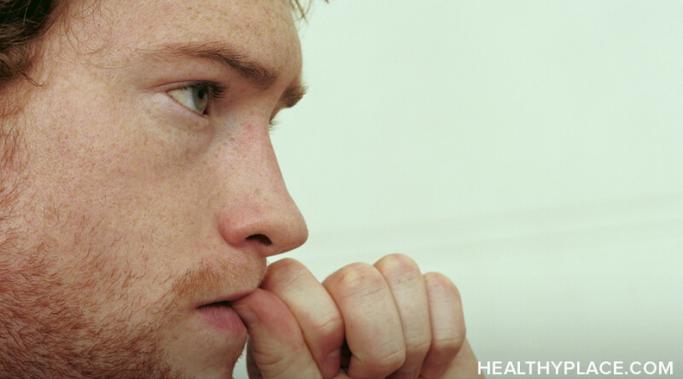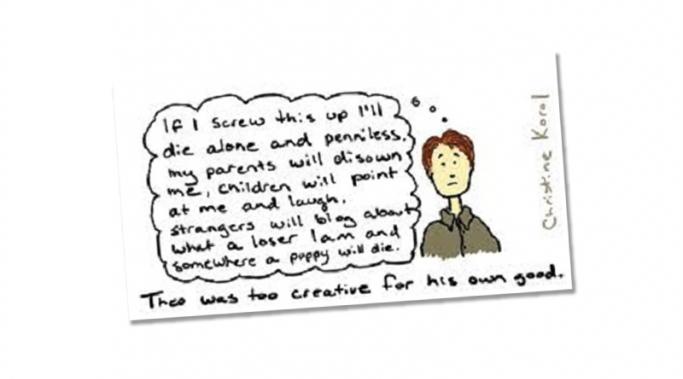If physical health was truly the gold standard for living well, instead of just the perception, I would be the luckiest man in the world. In my adult life, I haven't had the sniffles for more than a couple days. Frankly, my biggest physical flaw is that, as a redhead, my skin burns when I pass a beach-themed vacation poster.
Reality and perception are very different things. While my physical health can be defined as "pretty good for a middle aged guy," my mental health is best described as "dude, where are your pants?"
Anxiety-Schmanxiety
Like over 40 million people in the United States, I have an anxiety disorder. Two, actually: generalized and social. When living with anxiety, sometimes we're in control. Sometimes, though, anxiety is in control and it seems to chase and overpower us. I recently connected with psychologist and author Dr. Dan Peters, who calls anxiety the Worry Monster. That's apt. Just what does this monster do to people, and can we tame it?
This is my first video blog for HealthyPlace and I wanted to do something that I love, but which also causes me anxiety: public speaking. I want to show you what I go through when balancing these two things. For this reason, the video will be shot “live,” in one take only, with no edits, and all imperfections intact. No Retakes.
As I write this, I already feel the anxiety building. I’m taking a leap of faith that I hope will have a soft landing.
It’s no secret that anxiety is very difficult to ignore. Anxiety can be loud and demanding, and as a result, we focus on it. It’s very natural for us to do that, but sadly, focusing on anxiety can make it grow. We need to ignore anxiety by focusing on what anxiety is not.
My name is Gabe Howard. I live in Ohio, am married, a hockey fan (go Blue Jackets), a college football fan (go Buckeyes), a couch potato, the life of the party, a home owner, and a pizza connoisseur. I sleep too little, talk too much, and drive my wife mad. I tell her I do it because I like the company.
In my late 20s, I was diagnosed with bipolar, anxiety, and panic disorders. Everything changed pretty much overnight. Severe panic attacks, paranoia, and general anxiety sidelined me for a long while costing me a marriage, a career, friends, social status, money, and time.
Fear. Terror. Worry. Obsessive thoughts. Anxiety and all of its manifestations can be crippling. The mind races with worst-case scenarios, and the anxious thoughts can be unrelenting. As if the thoughts themselves aren't bad enough, it's common for another worry to bubble to the surface of the mind plagued by anxiety: are these thoughts real, and can I trust them?
As if anxiety itself weren't bad enough on its own, it presents new challenges and frustrations when we decide to face it and get rid of it once and for all. Probably because anxiety disorders are so prevalent (together, they are the most common of all mental illnesses), there's a plethora of proposed ways to treat anxiety. Trying to decide what is best for you is itself anxiety-provoking.
It can be confusing and frustrating. All around you, you see others attending meetings, luncheons, study groups, parties, and activities. "Everyone" seems able and willing to do so. But for you, the mere thought is horrifying. So what's up? Are you "simply" shy? Is it something more than that? The answer is actually quite personal.
It can be so disheartening to suffer a setback after moving forward in anxiety recovery for so long. Your anxiety and/or panic were once so intense and they got in the way of your ability to fully live your life the way you wanted to live it. You wanted more for yourself, so you worked your way past the obstacles and you were doing great. But then something happened to make anxiety flare up again, and it felt like you went back to square one, no longer moving forward in anxiety recovery at all. Disheartening indeed.
When you live with anxiety, it's frustrating to be told that it's "all in your head." Great news: you can begin to let go of this maddening annoyance. Anxiety isn't "in your head." Why? Because it is in your head. Literally. Anxiety is in your brain.









